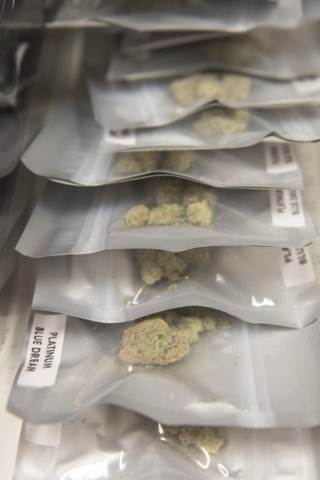No typical medical marijuana user in Nevada
Among the more than 11,000 people with state-issued patient cards are the very young and very old. They include people living with cancer, HIV, seizures, glaucoma or other conditions.
Newly released statistics provide the first detailed look at who uses medical marijuana — and why. The numbers are public thanks to recent legislation that relaxed a state confidentiality law.
"We can provide a slightly more colorful picture," said Pam Graber, a spokeswoman for the state's medical marijuana program.
The number of Nevadans with patient cards has grown by about one-third this year, with more than 2,800 added since January. As of September, 11,406 people had cards.
The numbers show cards are fairly evenly distributed among older and younger people, though older people remain slightly more likely to have them.
About 24 percent of cardholders are under age 35, while 14 percent are 65 or older. The latter number is identical to the percentage of Nevada's population over age 65, census figures show.
The age breakdown is similar among medical marijuana users in Oregon, according to statistics in that state.
Nevada also released numbers about the medical conditions doctors listed for cardholders. The vast majority of patients — almost 90 percent — have been diagnosed with severe pain, and 25 percent have muscle spasms. (The numbers add up to more than 100 percent because doctors can list more than one diagnosis.)
Though the use of medical marijuana by people with cancer or HIV has drawn much public attention, those conditions are listed for relatively small numbers of people.
There are 550 cardholders with cancer listed as a medical condition, and 98 with HIV or AIDS. It's possible, however, that more people with cancer or HIV are included in the "severe pain" category.
Jen Solas, who helps patients get cards as president of Wellness Education Cannabis Advocates of Nevada, said she was glad to see the numbers released.
Among other things, she said, they can help growers and dispensaries know their potential customers.
"(Companies) can actually see the demographic of who they're serving," Solas said.
The numbers from the state Division of Public and Behavioral Health have only been made available the past two months.
Previously, the law said the state had to "maintain the confidentiality" of virtually all information collected about medical marijuana. That clause — originally meant to protect patients' and doctors' privacy — inadvertently kept information about dispensaries and growers secret.
After changes that took effect July 1, the law protects more limited categories of information, such as individual patients' records and the tools used to evaluate companies' state applications.
As marijuana dispensaries have begun to open — there are now three in Clark County — the number of people applying for cards has increased.
Solas said she has noticed a particular jump in interest among young people. A few years ago, she said, more limited data released by the state showed cardholders were older than they are now.
About 69 percent of cardholders are from Clark County, which has 73 percent of the state's population.
More than 2,000 new patient cards have been approved since June. There were 680 new applicants in August and 765 in September, numbers that quickly overwhelmed state staff.
"The spike was unanticipated," Graber said.
The law requires the state to approve or deny a patient application within 30 days. But Chad Westom, a state health department bureau chief who oversees the medical marijuana program, said processing was taking about 65 days at one point over the summer.
So the state hired temporary extra staff to handle the backlog, bringing on about a dozen contract employees in late August, Graber said.
The state quickly got the backlog under control, and only a few of the new hires are still working, Graber said.
Westom said the state also had existing employees work overtime to process applications, meaning there was five times the normal staff working to clear the backlog.
— Contact Eric Hartley at ehartley@reviewjournal.com or 702-550-9229. Find him on Twitter: @ethartley























